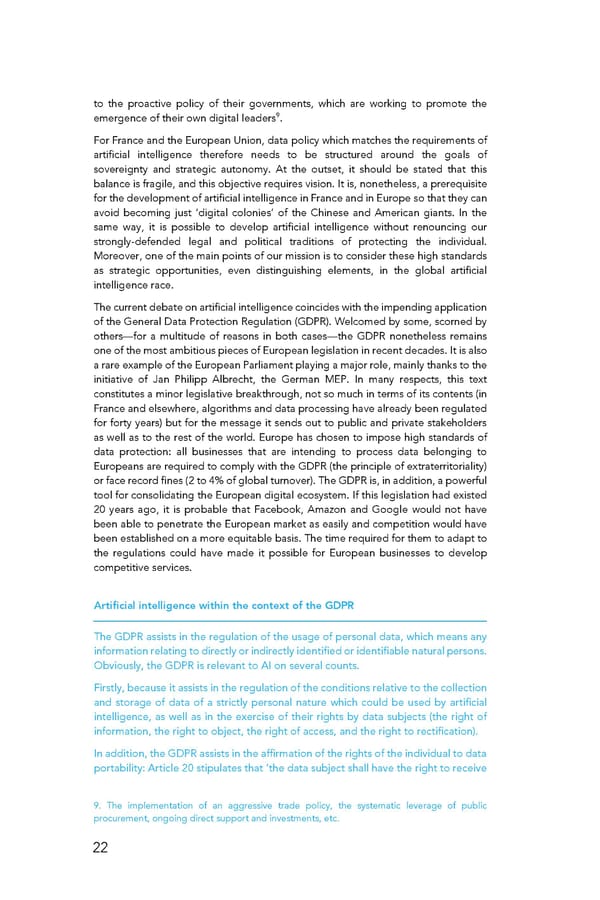to the proactive policy of their governments, which are working to promote the emergence of their own digital leaders9. For France and the European Union, data policy which matches the requirements of artificial intelligence therefore needs to be structured around the goals of sovereignty and strategic autonomy. At the outset, it should be stated that this balance is fragile, and this objective requires vision. It is, nonetheless, a prerequisite for the development of artificial intelligence in France and in Europe so that they can avoid becoming just ‘digital colonies’ of the Chinese and American giants. In the same way, it is possible to develop artificial intelligence without renouncing our strongly-defended legal and political traditions of protecting the individual. Moreover, one of the main points of our mission is to consider these high standards as strategic opportunities, even distinguishing elements, in the global artificial intelligence race. The current debate on artificial intelligence coincides with the impending application of the General Data Protection Regulation (GDPR). Welcomed by some, scorned by others—for a multitude of reasons in both cases—the GDPR nonetheless remains one of the most ambitious pieces of European legislation in recent decades. It is also a rare example of the European Parliament playing a major role, mainly thanks to the initiative of Jan Philipp Albrecht, the German MEP. In many respects, this text constitutes a minor legislative breakthrough, not so much in terms of its contents (in France and elsewhere, algorithms and data processing have already been regulated for forty years) but for the message it sends out to public and private stakeholders as well as to the rest of the world. Europe has chosen to impose high standards of data protection: all businesses that are intending to process data belonging to Europeans are required to comply with the GDPR (the principle of extraterritoriality) or face record fines (2 to 4% of global turnover). The GDPR is, in addition, a powerful tool for consolidating the European digital ecosystem. If this legislation had existed 20 years ago, it is probable that Facebook, Amazon and Google would not have been able to penetrate the European market as easily and competition would have been established on a more equitable basis. The time required for them to adapt to the regulations could have made it possible for European businesses to develop competitive services. Artificial intelligence within the context of the GDPR The GDPR assists in the regulation of the usage of personal data, which means any information relating to directly or indirectly identified or identifiable natural persons. Obviously, the GDPR is relevant to AI on several counts. Firstly, because it assists in the regulation of the conditions relative to the collection and storage of data of a strictly personal nature which could be used by artificial intelligence, as well as in the exercise of their rights by data subjects (the right of information, the right to object, the right of access, and the right to rectification). In addition, the GDPR assists in the affirmation of the rights of the individual to data portability: Article 20 stipulates that ‘the data subject shall have the right to receive 9. The implementation of an aggressive trade policy, the systematic leverage of public procurement, ongoing direct support and investments, etc. 22
 For a Meaningful AI - Report Page 22 Page 24
For a Meaningful AI - Report Page 22 Page 24